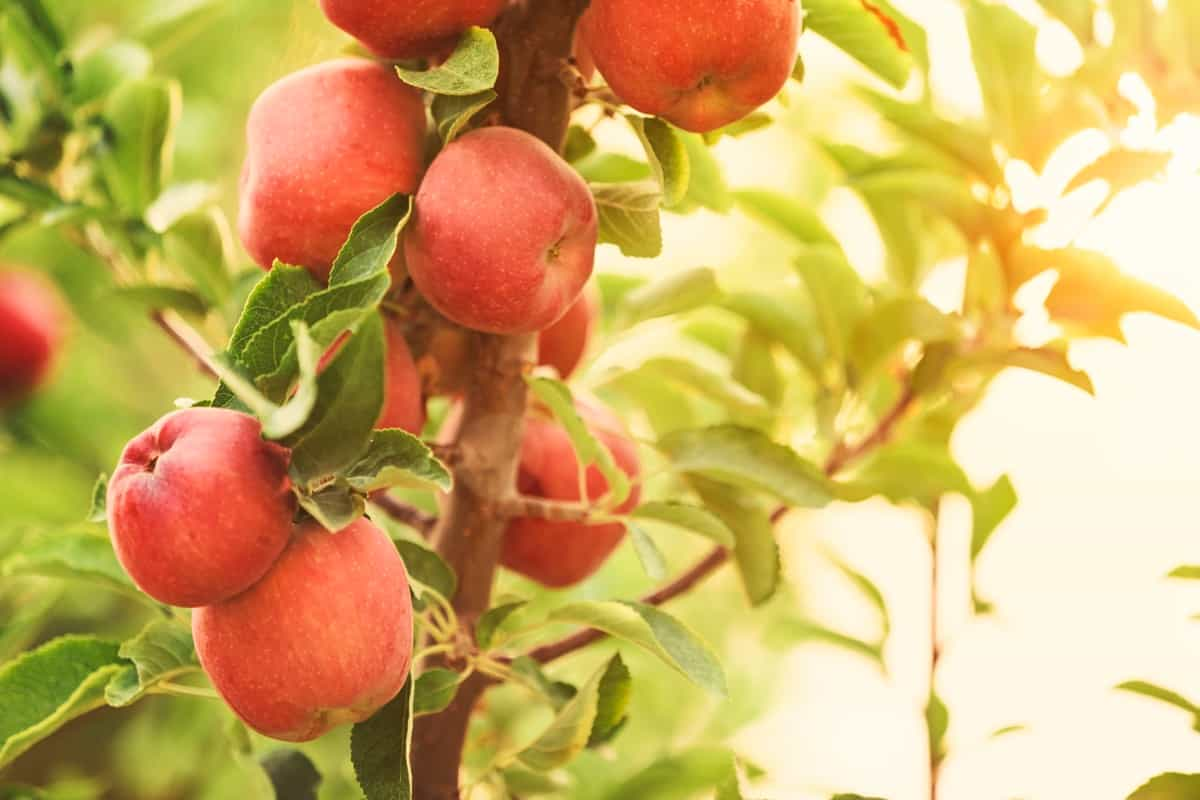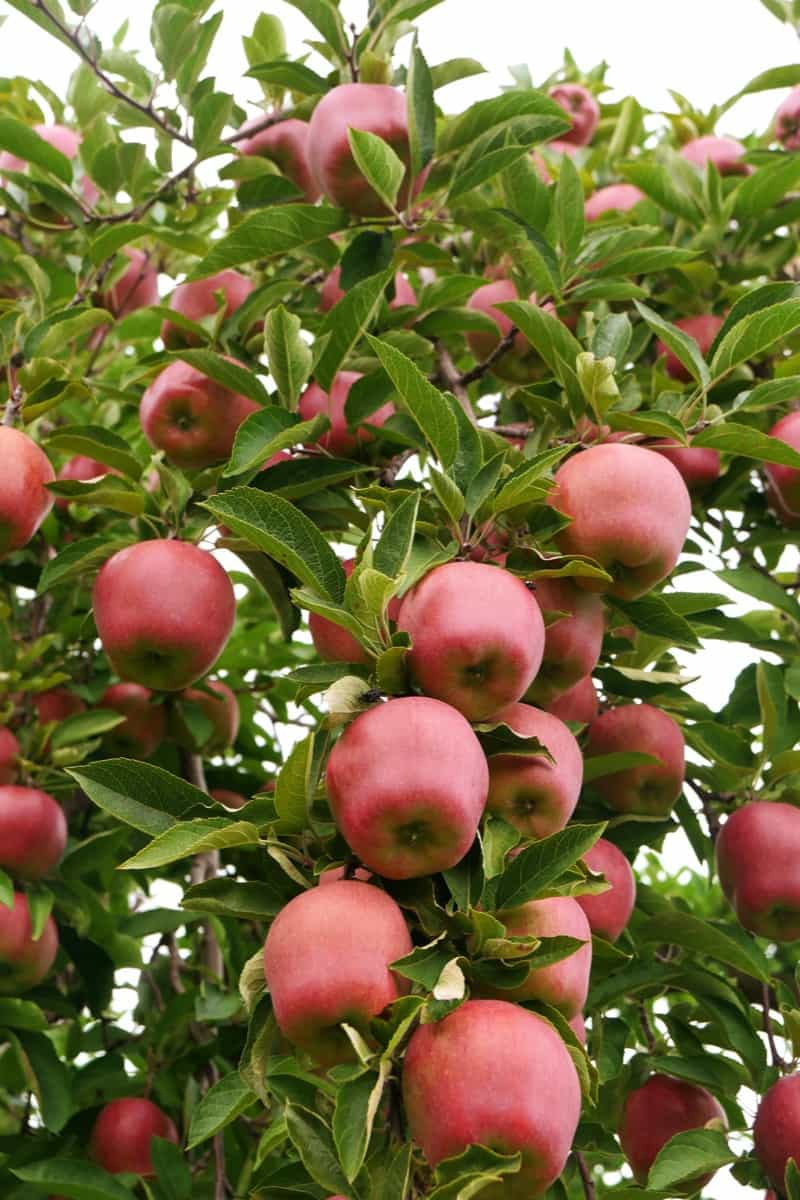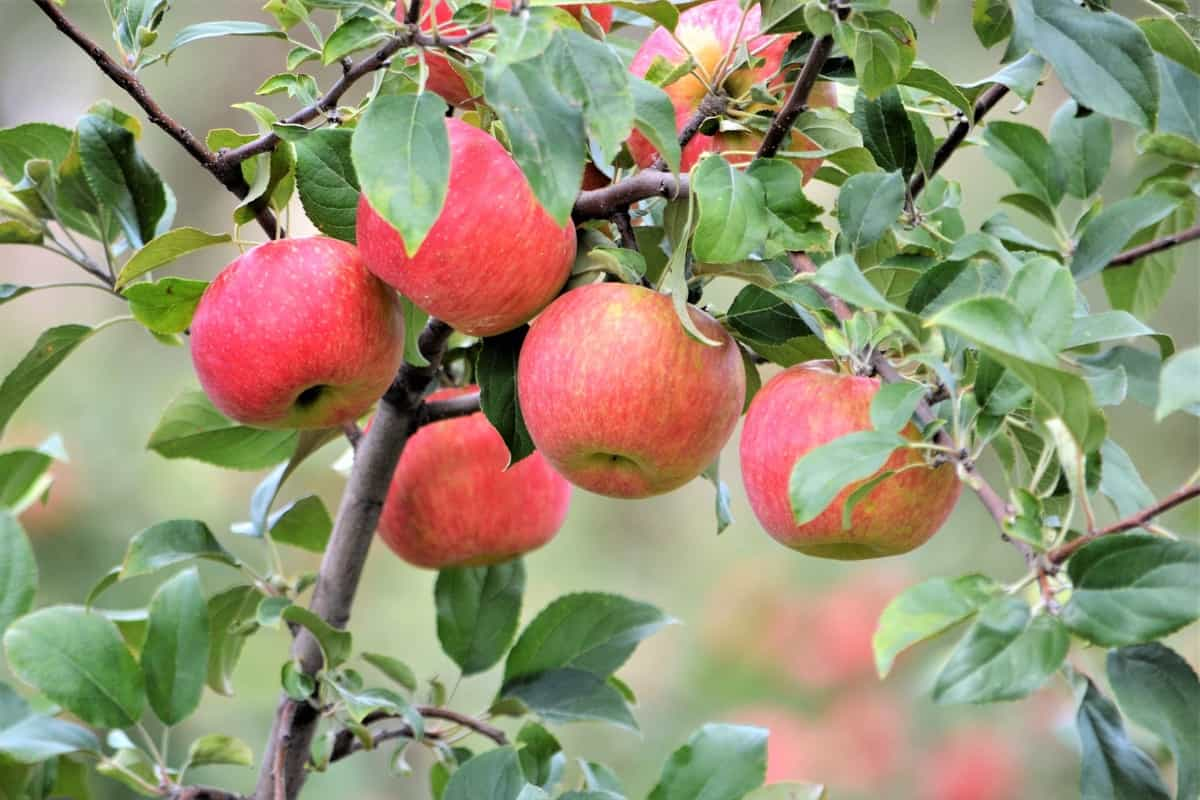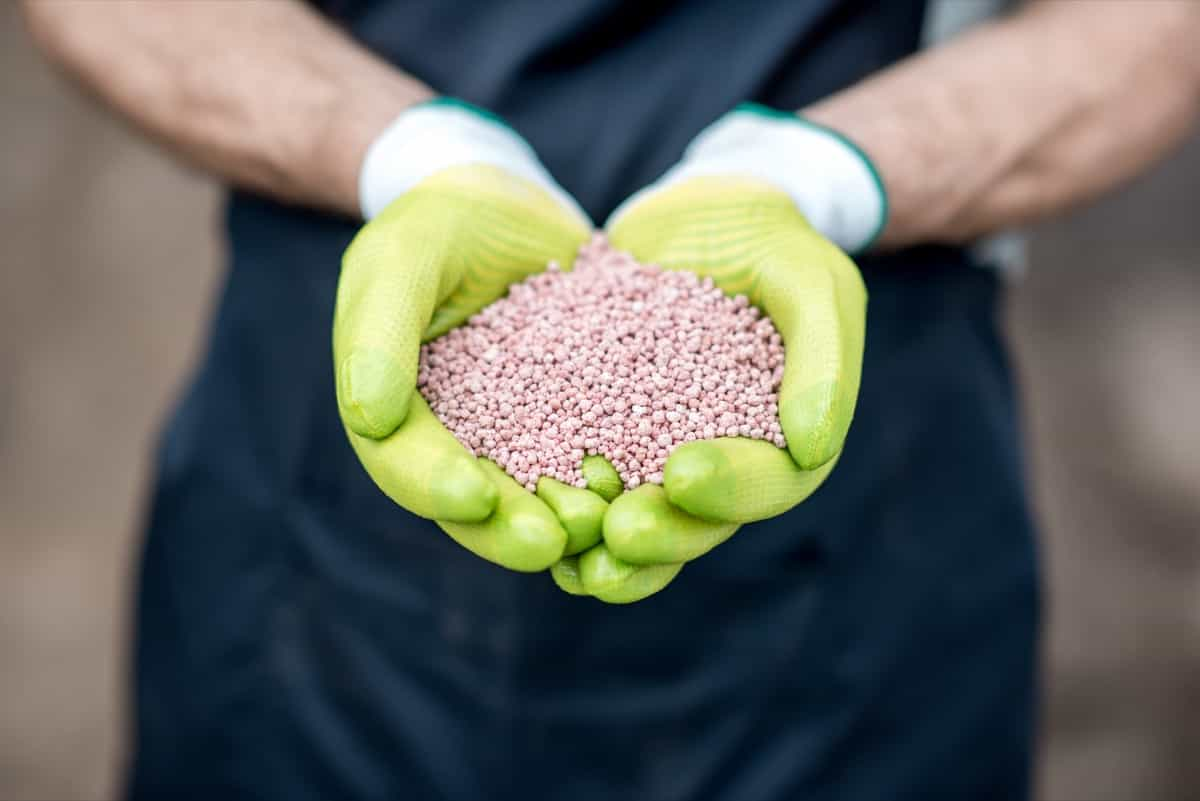Apple trees are one of the popular choices for home gardeners, as they not only provide delicious fruit but also add beauty to the landscape. To ensure healthy growth and bountiful harvests, proper fertilization is essential. In this guide, we will explore organic and natural fertilizers for potted apple trees, discuss homemade options, explain the importance of the NPK ratio, and provide guidance on when and how to apply fertilizers.

Fertilizing Potted Apple Trees
Signs Of Nutrient Deficiencies In Potted Apple Trees
Yellowing Leaves: One of the most noticeable signs of nutrient deficiencies in potted apple trees is the yellowing of leaves. The leaves turning yellow may indicate a lack of vital nutrients such as nitrogen, magnesium, or iron.
Stunted Growth: These deficiencies can also cause stunted growth in apple trees. If the tree’s growth seems slow and is not reaching its expected size, it may result from inadequate nutrient uptake.
Leaf Discoloration: Nutrient deficiencies can cause other leaf discolorations besides yellowing leaves. For example, a nitrogen deficiency can lead to leaves turning pale green, while a lack of magnesium can cause leaf margins to become yellow or brown.
Poor Fruit Development: Nutrient deficiencies can also affect the quality of the fruit produced by potted apple trees. If the fruits are small, misshapen, or have a dull appearance, it could indicate a lack of essential nutrients.
Leaf Curling: Another sign of nutrient deficiencies in potted apple trees is leaf curling. When the leaves curl inward or appear distorted, it may be a response to a lack of nutrients, particularly calcium or potassium.
Organic Fertilizers For Potted Apple Trees
Compost: It is a nutrient-rich organic material that can be made from kitchen waste, yard waste, and other organic matter. It provides a balanced supply of nutrients and improves soil structure, promoting healthy growth in potted apple trees.
Manure: Well-rotted manure from herbivorous animals such as cows, horses, or chickens can be an excellent source of nutrients for apple trees. It enriches the soil with essential elements like nitrogen, phosphorus, and potassium.
Fish Emulsion: It is a liquid fertilizer made from decomposed fish. It is rich in nitrogen and other trace minerals, making it an effective organic fertilizer for promoting vigorous growth in potted apple trees.
In case you missed it: Top 15 Apple Orchards in New Jersey: Best List of Apple Picking Spots in NJ

Natural Fertilizers For Potted Apple Trees
Bone Meal: A bone meal is a natural fertilizer made from ground animal bones. It is one of the good sources of phosphorus and calcium, promoting healthy root development and strong growth in potted apple trees.
Blood Meal: It is a natural fertilizer derived from dried animal blood. It is high in nitrogen and helps stimulate leaf and stem growth in apple trees.
Wood Ash: It is a byproduct of burning wood, and it contains potassium and other essential minerals. It can be used as a natural fertilizer to promote flowering and fruiting in potted apple trees.
Homemade Fertilizers For Potted Apple Trees
Homemade fertilizers are a cost-effective and environmentally friendly way to nourish potted apple trees. Composted chicken manure is a rich source of nutrients, including nitrogen, phosphorus, and potassium. It promotes healthy growth and fruit production. A blood meal is high in nitrogen and aids in leaf development. Soybean meal is another nitrogen-rich option that boosts overall plant vigor.
Cottonseed meal provides slow-release nitrogen and improves soil structure. Feather meal is one of the good sources of nitrogen and helps enhance root development. When used in combination, these homemade fertilizers create a balanced nutrient profile for potted apple trees, ensuring optimal growth and a bountiful harvest.
NPK Ratio For Potted Apple Trees
The NPK ratio for potted apple trees can greatly impact their overall health and productivity. Two commonly used ratios are 10-10-10 and 12-12-12. These numbers represent the nitrogen, phosphorus, and potassium percentages in the fertilizer. A 10-10-10 ratio means the fertilizer contains equal parts of all three nutrients, providing a balanced mix. This ratio is suitable for potted apple trees’ general maintenance and growth.
It ensures the tree receives adequate nutrients for healthy foliage, root development, and fruit production. On the other hand, a 12-12-12 ratio indicates a slightly higher concentration of nutrients. This ratio can be used when the tree requires a growth boost or shows signs of nutrient deficiencies. The higher levels of NPK in the fertilizer promote more vigorous growth, resulting in increased foliage and improved overall health.
When To Fertilize Potted Apple Trees
Early Spring: Fertilizing in early spring, just before the tree breaks dormancy, is highly recommended. This allows the tree to take the nutrients and use them efficiently as it starts its active growth phase.
Mid-Summer: Another crucial time to fertilize potted apple trees is in mid-summer. By this point, the trees have gone through a significant growth spurt and are developing fruit. Applying a balanced fertilizer during this period ensures the tree has the nutrients necessary to support fruit development.
Late Fall: Fertilizing in late fall, after the harvest season, is beneficial for potted apple trees. This helps replenish the soil’s nutrient content and prepares the tree for the coming winter months.
In case you missed it: Ultimate Guide to Black Diamond Apple: From Buying to Growing

How To Fertilize Potted Apple Trees
Choose the Right Fertilizer: Select a balanced fertilizer specifically formulated for fruit trees. Look for a fertilizer with a ratio of around 10-10-10 or 12-12-12, which provides a balanced mix of nitrogen, phosphorus, and potassium.
Measure the Correct Amount: Follow the manufacturer’s instructions to determine the appropriate amount of fertilizer based on the size and age of your potted apple tree. Over-fertilizing can harm the tree, so it’s crucial to measure accurately.
Apply the Fertilizer: Spread the fertilizer evenly around the tree’s base, avoiding direct contact with the trunk. Gently work the fertilizer into the soil surface using a rake or your hands, ensuring it is well incorporated.
Watering: After applying the fertilizer, thoroughly water the potted apple tree. This helps to activate the nutrients and allows them to penetrate the root zone effectively.
Best Organic Fertilizer Brands For Potted Apple Trees
The best organic fertilizer brands for potted apple trees provide essential nutrients and promote healthy growth. Some top options include Jobe’s Organics Fruit & Citrus Fertilizer, Dr. Earth Organic 5 Tomato, Vegetable & Herb Fertilizer, and Espoma Organic Tree Tone Fertilizer. These brands are trusted for their quality and effectiveness.
Benefits Of Organic Fertilizers For Potted Apple Trees
- Firstly, they provide essential nutrients that promote healthy growth and development.
- Secondly, they enhance soil structure, improving the tree’s root system and nutrient absorption.
- Thirdly, organic fertilizers are environmentally friendly, minimizing the risk of chemical runoff.
- Overall, using organic fertilizers ensures optimal growth and a healthier apple tree.
Common Mistakes When Fertilizing Potted Apple Trees
- Over-fertilizing can damage potted apple trees by burning the roots and causing leaf burn.
- Under-fertilizing can result in stunted growth and poor fruit production.
- Fertilizing too close to the trunk can lead to root burn and rot.
- Using the wrong fertilizer can result in nutrient imbalances and deficiencies.
- Fertilizing too late in the season can disrupt the tree’s natural growth cycle.
- Neglecting to water the tree properly after fertilizing can reduce the effectiveness of the fertilizer.
In case you missed it: 15 Best Apple Picking Farms in Massachusetts (MA): Top Orchards for Central, Southern, and Northern Regions

Conclusion
By understanding the NPK ratio, adhering to proper timing, and following correct application techniques, you can ensure the success of your potted apple trees and enjoy a fruitful harvest.
- Feed Your Flock for Less: Top 10 Tips to Save on Chicken Feed
- Ultimate Guide to Ossabaw Island Hog: Breeding, Raising, Diet, and Care
- Hatching Answers: The Top 10 Reasons Your Chickens Aren’t Laying Eggs
- Eggs and Economics: Breaking Down the Cost of Raising Backyard Chickens
- Defend Your Greens: Proven Methods to Keep Iguanas Out of Your Garden
- Ultimate Guide to Cinnamon Queen Chicken: A Comprehensive Guide for Beginners
- Ultimate Guide to California Tan Chicken: Breeding, Raising, Diet, Egg-Production and Care
- Ultimate Guide to Marsh Daisy Chicken: Breeding, Raising, Diet, and Care
- 10 Types of Chicken Farming Businesses You Can Start for Profits